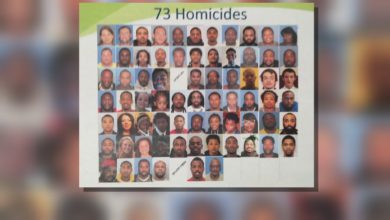WASHINGTON — One year ago this week, Toledo, Ohio, collected more income tax revenue than at any point in the city's 188-year history.
Then the COVID-19 pandemic hit.
Businesses closed in the working-class Midwest city of 275,000 people, unemployment spiked, income dropped – and the city's primary source of revenue cratered.
Down $15 million in income tax collections from the record high – an 8% decline – the City of Toledo dipped into its reserves. The city furloughed more than 300 government employees, postponed maintenance on vehicle fleets, delayed street paving and pothole repairs and canceled an incoming class of firefighters.
"I understand it's a time of sacrifice," said Wade Kapszukiewicz, mayor of Toledo, which has 60 fewer city workers than last year. "I know businesses have had to tighten their belts and families have as well. I get it. But what is remarkable is that almost a year into this, we have not received a single penny of revenue replacement relief from Uncle Sam."
Kapszukiewicz, a Democrat, is among more than 400 mayors who signed a letter urging "immediate action" from Congress to pass Biden's $1.9 trillion COVID-19 relief bill, dubbed the American Rescue Plan, which includes $350 billion in direct aid to state and city governments.
Biden wants to replenish local governments with revenue lost in the pandemic so they can pay police officers and firefighters, keep libraries and recreation centers open and provide other core services. It's in addition to $130 billion proposed to help reopen public schools.
"The need is real," Kapszukiewicz said.
More:5 charts show the wide gap between Biden's, Republicans' coronavirus aid proposals
But the aid is one of the most debated pieces of the legislation – a rallying cry for Democrats over the past year resisted by former President Donald Trump and congressional Republicans.
In a $618 billion counterproposal to Biden's legislation, Republicans eliminated the $350 billion for state and local governments entirely. A $900 billion COVID-19 relief package passed in December, when Republicans controlled the Senate and occupied the White House, contained no financial aid for state and local governments.
Republicans have slammed the city and state relief as an unneeded bailout for liberal-controlled cities and states that mismanaged finances. This week they seized on a new J.P. Morgan study that found revenue growth in state governments declined only marginally since the pandemic hit, hardly the doomsday scenario that many forecasted last spring.
"I think the biggest gap between the president's proposal and the Republican proposal relates to ($350 billion) or so going to states and localities," Sen. Mitt Romney, R-Utah, told reporters. "That kind of number just makes no sense at all."

Lack of revenue growth leaves budget shortfalls
The White House hasn't budged on the overall price tag of the bill – arguing the U.S. must "go big" to respond to pandemic – nor the $350 billion for states and cities.
"I think our objective is to focus on not JP Morgan reports, but what state, local governments and others are telling us they need," White House Press Secretary Jen Psaki said.

The JP Morgan analysis found a revenue loss of just .12% collectively across 47 states sampled since the pandmeic through September. While 26 states experienced a revenue decline, the report found 21 states saw positive revenue growth in 2020 compared to 2019.
"Can the White House demonstrate a fact-based explanation for sending $350 billion in unneeded taxpayer money to the states?" Republican Senate Minority Leader Mitch McConnell's office said in a news release.
And yet J.P Morgan analysts also noted something Republicans have ignored: States on average had anticipated 3% growth in 2020, according to the National Association of Budget Officers. Instead the general fund revenue decline is the first since the Great Recession.
That has resulted in aggregate shortfalls of 3.8% below projections for the current fiscal year and is expected to grow to 11.8% next year, the budget officers association says. Across all state governments, Moody's Analytics predicts a $434 billion budget shortfall through 2022.
"The shortfall comes as revenues have fallen short of projections, while COVID-19 related expenditures, healthcare/Medicaid enrollment, and other costs grow," J.P. Morgan's 2021 Municipal Market Outlook says.
'You've got to grow your way out of the problem,' GOP governor says
States that rely heavily on tourism have experienced the greatest decline in tax revenues, according to J.P. Morgan: Hawaii (-13.6%), Nevada (-13%) and Florida (-7.9%). Others most affected are states that rely on the fossil fuel industry: North Dakota (-9.7%), West Virginia (-6.8%), and Texas (-6.8%).
"I am not a proponent of bailing out failed pension funds that have decades and decades of poor history," West Virginia Gov. Jim Justice, a Republican, told USA TODAY. "But we should do things to address states' and local governments' needs that have happened because of this unbelievable pandemic. There are many needs within states."
Justice has been the most outspoken Republican nationally in support of Biden's COVID-19 relief legislation. He said a trimmed down stimulus bill would have a result akin to a climber nearly reaching the top of a mountain, only to slide down, leading to a "catastrophic" outcome.
More:Who are the 10 Republican senators meeting with President Joe Biden on COVID stimulus?

West Virginia has drained its unemployment reserve fund during the pandemic. Justice said the federal government should not "cure past sins" of poor state financing but should help states "weather the storm."
"It is a burden that a lot of states just cannot possibly carry," Justice said, adding that they can't cut their way out of the problem. "You've got to grow your way out of the problem."
Some states collecting far more revenue than once feared
The most dire revenue forecasts during the early months of the pandemic didn't materialize, helping fuel criticism that the relief for states and cities isn't needed. States had braced for a more severe economic downturn.
Wisconsin, for example, expects by next summer to take in $1.2 billion more in revenue than was projected last year. Tax revenue in Wisconsin is up 4%, according to the J.P. Morgan report. States where tax collections have increased the most are Vermont (+12.8%), Idaho (+10.8%), South Dakota (+7.9%), and New Mexico (+7.4%).
The misprojections explain why Biden's COVID-19 relief bill earmarks less than one-third the $915 billon previously set aside for states and cities in the Democrat-backed HEROES Act last year. The bill passed the House, but was never taken up in the then-Republican-controlled Senate.
More:A chasm opens in COVID-19 relief talks. Can Biden and Republicans close the trillion-dollar gap?

Arkansas Gov. Asa Hutchinson, a Republican, said the $350 billion would be "good news for the states" but questioned whether it's really necessary. He expressed concern about raising the national debt.
"I think this is where there needs to be some negotiation down from the $1.9 trillion," Hutchinson said, noting that Arkansas has a surplus of $240 million from the previous year. "Our unemployment has dropped. People are going back to work. Our economy is sound and our state budget is sound."
If Congress approves the direct aid, Hutchinson said he hopes to have flexibility to use his state's portion on high-speed rural broadband along with restoring the state's Unemployment Insurance Trust fund.
"From an Arkansas standpoint, we'll take it. We'll invest it carefully. But whenever you balance our need with the price-tag for all the taxpayers, I would take a more conservative approach."
1.4 million public sectors jobs cut since pandemic
Economists warn that the fiscal situation varies by city and state – depending on local economies and revenue streams – and even though states and cities avoided worst-case revenue scenarios, financial strains are real.
"The picture, though rosier, is not rosy in the least," Dan White, a researcher at Moody’s Analytics, wrote in an analysis last month. "What’s more, the picture is not uniform across all governments, with some still in significant distress."
Cities and States cut 1.4 million public sector jobs since the pandemic started, Bloomberg News reported, citing preliminary data from the Bureau of Labor Statistics.
A Brookings Institute study in September found significantly smaller income tax losses than anticipated last spring because unemployment largely concentrated among low-wage workers. But the report found losses in sales tax and fees – including $45 billion in lost revenue from the decline of public transit – were much larger than expected.
More:Coronavirus pandemic, January jobs report, Amanda Gorman: 5 things to know Friday

The federal CARES Act, which Trump signed into law last March, provided $150 billion through the Coronavirus Relief Fund to all states as well as the 38 cities with more than 500,000 people. But funds were limited to expenses "directly related" to COVID-19, not replacing lost revenue.
The CARES Act and other federal aid wasn't enough to erase "tough budget choices and poor macroeconomic outcomes," the Brookings study found. State governments will have to limit spending and make cuts if the economy remains below pre-COVID levels, the study found, even as demand for government service is high during the pandmeic.
"Simply maintaining pre-COVID levels of spending may not be enough to assure that necessary services aren’t cut," the Brookings study says.
'Years for many cities to come out'
The National Governors Association, chaired by New York Gov. Andrew Cuomo and co-chaired by Hutchinson, has not taken a stance on Biden's American Rescue Plan. But in April, the group said "Congress must appropriate" an additional $500 billion for all states and territories to meet budgetary shortfalls.
In a conference call with reporters last week urging passage of Biden's bill, leaders of the U.S. Conference of Mayors painted a bleak picture for several cities:
► Dayton, Ohio, cut 102 city positions last year and is putting off new police and fire classes this year.
► Detroit has a projected revenue loss of $154 million for 2020 and $280 million in 2021. The city laid off 200 employees and reduced hours of 2,000 employees.
► Pittsburgh had a $56 million budget shortfall in 2020 and might have to lay off or furlough 600 employees this year.
► New Orleans has only collected 57% of what it had budgeted in sales tax; total revenue loss at the end of 2020 was around $152 million.
"This will take years for many cities to come out, and every day that Congress doesn't pass the rescue package affects the recovery and the economy," said Dayton Mayor Nan Whaley, vice chair of the conference of mayors.
More:US unemployment claims fall to 779,000 but job cuts grind on

Tacoma, Wa., Mayor Victoria Woodards, citing a survey from the National League of Cities, said 90% of municipal governments have experienced a revenue decrease of at least 21% and 76% of cities have experienced an expenditure increase of 17%. Woodward said Tacoma is facing a $32 million budget shortfall and would have to put off capital projects.
“We cannot leave – I repeat, we cannot leave – America’s hometowns behind,” Woodards said.
In Toledo, Kapszukiewicz called it "preposterous" to argue the finances of America's cities have not been negatively affected by the pandmeic. Although Toledo received $25.1 million from the CARES package, he said all of if went toward COVID-related expenses – overtime for police officers, for example, to enforce COVID safety restrictions – not covering depleted tax revenue.
"Toledo is a resilient city," he said. "We've been knocked down countless times over the last 50 years or so. We know how to take a punch. So we'll get back up. We'll survive. But to somehow argue that we've not been negatively affected, or that the storm has passed, is totally inaccurate."
Reach Joey Garrison on Twitter @joeygarrison.
Source link








